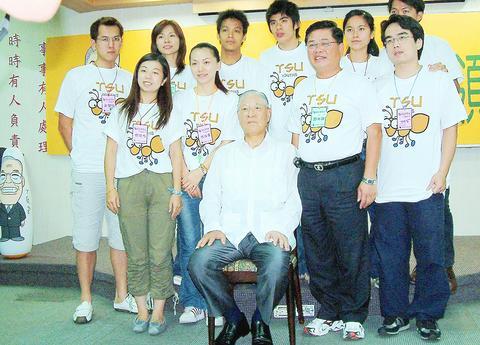Further economic integration between Taiwan and China would not benefit Taiwan, former President Lee Teng-hui (李登輝) said yesterday.
Speaking at a seminar for young people organized by the TSU, Lee said that basic economic theory suggested that a closer relationship with China would be detrimental to Taiwan.
As the two economies integrate, Lee said, there would an equalization between the factors of production -- land, labor, capital, brainpower, etc. -- and prices.

PHOTO: CNA
"If we keep strengthening the economic ties and integration between Taiwan and China," Lee said, "real-estate prices, interest rates and salary levels in this nation will slump and finally fall to the same level as China's."
With his young audience in mind, Lee said: "With more and more Chinese university graduates and workers flooding into Taiwan, it would be harder and harder for you to find a job."
He also pointed to the examples of Germany and Hong Kong, both of which have experienced severe economic problems in the wake of unification.
"Those who support the so-called `common market' concept are stupid people in my eyes," Lee said.
Further economic integration would in fact only benefit those businessmen with interests in China, Lee said. "However, the majority of the workforce, including farmers, white-collar workers, blue-collar workers, soldiers, teachers and civil servants would not get a dime," he said.
"The middle class is the stabilizing power in Taiwan. Nothing can be done if you don't look after them," Lee said, "because it is they who tend to defend values of democracy and freedom, which are the core values of Taiwan."
Lee asked the students participating in the seminar to mull over "meaning of the existence of Taiwan's subjectivity."
"Although we are of different generations," Lee told his audience, "we all have to face the same threats from China together. So you must learn how to resist bravely the political, economic, psychological and military threats from China, and learn not to surrender to Chinese hegemony because of its pressure."
Citing Abraham Lincoln's speech that a nation could not be both "half slave and half free," Lee described Beijing's "one country, two systems" concept as evil..
"It denies the given rights of Taiwanese to choose their future for themselves. The concept not only threatens people in Taiwan, but others elsewhere as well," Lee said.
"Some people in Taiwan have been infected with the `one-China' virus, and they indulge in wishful thinking that, if we concede to China politically, there will be peace. But ... peace will not come. Pre-World War II Europe is the best example to show that appeasement only brings war. it shows an aggressor that threats work," he said.
"In [the Old Testament book of] Exodus, the Israelites complained to Moses that the escape from Egypt only brought pain and turbulence. They asked to go back to Egypt," said Lee. "But should we go back and live a life of slavery?" he said.

ENDEAVOR MANTA: The ship is programmed to automatically return to its designated home port and would self-destruct if seized by another party The Endeavor Manta, Taiwan’s first military-specification uncrewed surface vehicle (USV) tailor-made to operate in the Taiwan Strait in a bid to bolster the nation’s asymmetric combat capabilities made its first appearance at Kaohsiung’s Singda Harbor yesterday. Taking inspiration from Ukraine’s navy, which is using USVs to force Russia’s Black Sea fleet to take shelter within its own ports, CSBC Taiwan (台灣國際造船) established a research and development unit on USVs last year, CSBC chairman Huang Cheng-hung (黃正弘) said. With the exception of the satellite guidance system and the outboard motors — which were purchased from foreign companies that were not affiliated with Chinese-funded

PERMIT REVOKED: The influencer at a news conference said the National Immigration Agency was infringing on human rights and persecuting Chinese spouses Chinese influencer “Yaya in Taiwan” (亞亞在台灣) yesterday evening voluntarily left Taiwan, despite saying yesterday morning that she had “no intention” of leaving after her residence permit was revoked over her comments on Taiwan being “unified” with China by military force. The Ministry of the Interior yesterday had said that it could forcibly deport the influencer at midnight, but was considering taking a more flexible approach and beginning procedures this morning. The influencer, whose given name is Liu Zhenya (劉振亞), departed on a 8:45pm flight from Taipei International Airport (Songshan airport) to Fuzhou, China. Liu held a news conference at the airport at 7pm,

AIR SUPPORT: The Ministry of National Defense thanked the US for the delivery, adding that it was an indicator of the White House’s commitment to the Taiwan Relations Act Deputy Minister of National Defense Po Horng-huei (柏鴻輝) and Representative to the US Alexander Yui on Friday attended a delivery ceremony for the first of Taiwan’s long-awaited 66 F-16C/D Block 70 jets at a Lockheed Martin Corp factory in Greenville, South Carolina. “We are so proud to be the global home of the F-16 and to support Taiwan’s air defense capabilities,” US Representative William Timmons wrote on X, alongside a photograph of Taiwanese and US officials at the event. The F-16C/D Block 70 jets Taiwan ordered have the same capabilities as aircraft that had been upgraded to F-16Vs. The batch of Lockheed Martin

GRIDLOCK: The National Fire Agency’s Special Search and Rescue team is on standby to travel to the countries to help out with the rescue effort A powerful earthquake rocked Myanmar and neighboring Thailand yesterday, killing at least three people in Bangkok and burying dozens when a high-rise building under construction collapsed. Footage shared on social media from Myanmar’s second-largest city showed widespread destruction, raising fears that many were trapped under the rubble or killed. The magnitude 7.7 earthquake, with an epicenter near Mandalay in Myanmar, struck at midday and was followed by a strong magnitude 6.4 aftershock. The extent of death, injury and destruction — especially in Myanmar, which is embroiled in a civil war and where information is tightly controlled at the best of times —